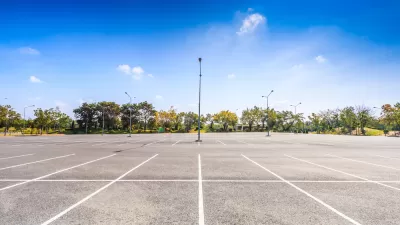The city’s latest revisions to its Unified Development Ordinance call for expanded parking requirements near residential neighborhoods.

“Despite the fact that Charlotte wants to be less car-reliant, the city, in overhauling its development regulations, is still requiring developers to include a minimum number of parking spots in many new projects, especially those near residential neighborhoods.” As Alexandria Sands reports for WBTV, this is in part due to concerns about the city’s public transit system, which doesn’t serve all parts of the city reliably, as well as the availability of parking in residential areas.
In the city’s latest draft Unified Development Ordinance, “Multi-family housing developments within 400 feet of a low-density housing neighborhood,” which currently have no parking requirements, would require at least one space per housing unit. Certain businesses, such as bars and entertainment venues, within 400 feet of neighborhoods would also have to add parking spots, broadening the requirement from the current 200 feet.
Elsewhere in North Carolina, Raleigh eliminated parking requirements altogether, but uses residential parking permits to regulate non-resident parking in neighborhoods.
FULL STORY: Charlotte is stopping short of eliminating parking minimums

Planetizen Federal Action Tracker
A weekly monitor of how Trump’s orders and actions are impacting planners and planning in America.

Maui's Vacation Rental Debate Turns Ugly
Verbal attacks, misinformation campaigns and fistfights plague a high-stakes debate to convert thousands of vacation rentals into long-term housing.

Restaurant Patios Were a Pandemic Win — Why Were They so Hard to Keep?
Social distancing requirements and changes in travel patterns prompted cities to pilot new uses for street and sidewalk space. Then it got complicated.

In California Battle of Housing vs. Environment, Housing Just Won
A new state law significantly limits the power of CEQA, an environmental review law that served as a powerful tool for blocking new development.

Boulder Eliminates Parking Minimums Citywide
Officials estimate the cost of building a single underground parking space at up to $100,000.

Orange County, Florida Adopts Largest US “Sprawl Repair” Code
The ‘Orange Code’ seeks to rectify decades of sprawl-inducing, car-oriented development.
Urban Design for Planners 1: Software Tools
This six-course series explores essential urban design concepts using open source software and equips planners with the tools they need to participate fully in the urban design process.
Planning for Universal Design
Learn the tools for implementing Universal Design in planning regulations.
Heyer Gruel & Associates PA
JM Goldson LLC
Custer County Colorado
City of Camden Redevelopment Agency
City of Astoria
Transportation Research & Education Center (TREC) at Portland State University
Jefferson Parish Government
Camden Redevelopment Agency
City of Claremont





























